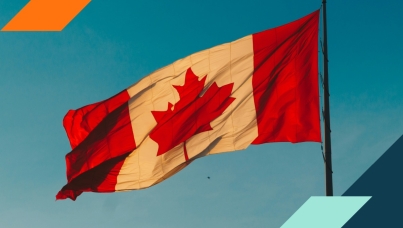As Tories Gather to Discuss Policy,
Canadians Weigh in On Harper's Policy Options
In the spirit of Halloween, the Prime Minster unveiled some "treats" for consumers in the recently-delivered Throne Speech, many of which appear to be resonating and could convince some voters to support the Tories going forward:
- Fully one half (50%) of Canadians say they would be more likely to vote for the Conservative Party in the next election if the government were to require all members of Parliament and Senators to post their travel and offices expenses online so all Canadians can see them. Just 5% say they'd be less likely to support the Tories as a result of this policy, while 45% say there's no change in their propensity to vote Tory as a result.
- Half (50%) say they'd be more likely to vote for them if they were to pass a law requiring companies selling products in both the US and Canada to charge similar prices to both American and Canadian consumers, while 6% would be less likely to vote Conservative and 44% express no change.
- Nearly half (47%) would be more likely to vote Tory if they pass a law requiring TV cable companies to allow consumers to pick the specific pay TV channels they want as opposed to making them buy bundles that include channels they don't want, while 5% say it makes them less likely and 48% say there's no change.
- A similar proportion (46%) is more likely to vote Conservative if they pass a law requiring credit card companies to provide clearer information on their charges, and to also restrict the rates they can charge to both small business and consumers. One in twenty (5%) are turned off the Tories as a result of this policy, while 49% say the policy doesn't make them any more or less likely to vote Conservative.
- Four in ten (44%) would be more likely to vote Conservative if the government were to pass a law that limits the roaming fees that cell phone companies can charge to customers who are travelling. One in twenty (5%) say they're less likely to support the Tories as a result, while 52% say there's no change.
- Four in ten (40%) might be wooed if the Tories were to pass a law that requires airlines to provide greater compensation for passengers that are bumped off of flights that are oversold. Just 5% say they'd be less likely to vote Tory as a result, while 55% report no change in their vote consideration.
- Three in ten (30%) say they'd be more likely to vote Tory if the government were to change parliamentary procedures to give individual MPs a greater say in how the country is run. One in ten (8%) would be less likely to vote for the Tories if they did this, while 62% say it doesn't impact their consideration either way.
In general, the pro-consumer angle, and the subsequent traction it could create for the Tories, resonates particularly well in the Prairies (where the Conservatives are already strong), but also in Quebec, where the Tories are the least competitive of the national parties. Quebecers (37%) are also the most supportive of increasing the freedom of individual MPs.
Some might argue that the Tories are simply preaching to the choir, meaning that the policies are making current Tory supporters more likely to vote Tory in the next election - and this is true. However, many of these policies are resonating well among current supporters of other parties as well. The worst-performing policy among supporters of other parties relates to the law which would require airlines to provide greater compensation for passengers that are bumped off oversold flights. Even so, 29% of Liberal supporters said they would be more likely to vote Conservative as a result, compared to just 7% who would be less likely. Most other policies had 30% to 40% of Liberal, NDP or Bloc supporters saying they would be more likely to vote for the Conservatives as a result of the policy, suggesting that the carrot the Tories are dangling in front of voters has the potential to be enticing.
Tories Own Economy, But Lag Elsewhere...
The Conservative's bread and butter issue remains the economy - which previous research has reinforced as Canadians' top issue, so it's still a good place to be - but most other issues are owned by other parties. Below is a list of policy areas, and the proportion of Canadians who believe that each respective party would do the best job, if elected, of managing each issue:
- Reducing unemployment for young people: NDP (38%), Liberal (34%), Conservative (28%)
- Keeping taxes under control: Conservative (38%), NDP (33%), Liberal (29%)
- Making sure Canada is expanding its trading relationships around the world: Conservative (42%), Liberal (35%), NDP (23%)
- Having a good balance between economic growth and protecting our environment: NDP (38%), Liberal (32%), Conservative (30%)
- Spending taxpayers money wisely: NDP (37%), Conservative (34%), Liberal (30%)
- Having policies that promote innovative ideas that create prosperity and jobs: NDP (36%), Liberal (33%), Conservative (32%)
- Protecting the rights of the average working person: NDP (49%), Conservative (26%), Liberal (25%)
- Managing the economy: Conservative (40%), Liberal (32%), NDP (28%)
- Making sure that organizations that produce food in Canada are propertly inspected and that our food is safe: NDP (37%), Conservative (32%), Liberal (31%)
- Making sure that Canadian consumers are treated fairly when buying goods and services in the marketplace: NDP (36%), Conservative (34%), Liberal (30%)
- Making sure that the policies they bring in will strike the right balance between protecting consumers and treating businesses fairly: NDP (34%), Conservative (33%), Liberal (32%)
These are some of the findings of poll conducted between October 16th to 20th on behalf of CTV News. For this survey, a sample of 1,042 Canadian was interviewed via Ipsos' Canadian online panel. Weighting was then employed to balance demographics to ensure that the sample's composition reflects that of the adult population according to Census data and to provide results intended to approximate the sample universe. The precision of Ipsos online polls is measured using a credibility interval. In this case, the poll is accurate to within +/-3.4 percentage points had all Canadians adults been polled. All sample surveys and polls may be subject to other sources of error, including, but not limited to coverage error, and measurement error.
For more information on this news release, please contact:
Darrell Bricker, PhD
CEO
Ipsos Public Affairs
416.324.2002
[email protected]
About Ipsos Reid
Ipsos Reid is Canada's market intelligence leader, the country's leading provider of public opinion research, and research partner for loyalty and forecasting and modelling insights. With operations in eight cities, Ipsos Reid employs more than 600 research professionals and support staff in Canada. The company has the biggest network of telephone call centres in the country, as well as the largest pre-recruited household and online panels. Ipsos Reid's marketing research and public affairs practices offer the premier suite of research vehicles in Canada, all of which provide clients with actionable and relevant information. Staffed with seasoned research consultants with extensive industry-specific backgrounds, Ipsos Reid offers syndicated information or custom solutions across key sectors of the Canadian economy, including consumer packaged goods, financial services, automotive, retail, and technology & telecommunications. Ipsos Reid is an Ipsos company, a leading global survey-based market research group.
To learn more, please visit www.ipsos.ca.
About Ipsos
Ipsos is an independent market research company controlled and managed by research professionals. Founded in France in 1975, Ipsos has grown into a worldwide research group with a strong presence in all key markets. In October 2011 Ipsos completed the acquisition of Synovate. The combination forms the world's third largest market research company.
With offices in 85 countries, Ipsos delivers insightful expertise across six research specializations: advertising, customer loyalty, marketing, media, public affairs research, and survey management.
Ipsos researchers assess market potential and interpret market trends. They develop and build brands. They help clients build long-term relationships with their customers. They test advertising and study audience responses to various media and they measure public opinion around the globe.
Ipsos has been listed on the Paris Stock Exchange since 1999 and generated global revenues of e1,789 billion (2.300 billion USD) in 2012.
Visit www.ipsos.com to learn more about Ipsos' offerings and capabilities.



